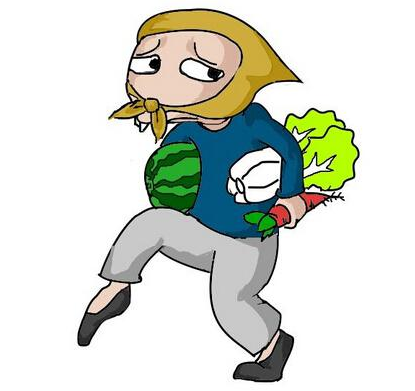(单词翻译:单击)
Stealing food from a supermarket may not be a crime in Italy if you are homeless and hungry, the nation's highest appeals court has ruled.
在意大利,如果你无家可归,饥肠辘辘,从超市偷食物可能不构成犯罪,意大利最高上诉法院作出了这样的判决。
In a case that has drawn comparisons to "Les Miserables," the Supreme Court of Cassation threw out the conviction of a homeless man from Ukraine, Roman Ostriakov, who was caught trying to take 4.07 euros worth of cheese and sausage from a store in Genoa without paying for it. A trial court sentenced him in February 2015 to six months in jail and a fine of 100 euros.
在这个堪与《悲惨世界》相对比的案件中,来自乌克兰的无家可归男子罗曼·奥斯特里亚科夫在热那亚一家商店被试图偷窃价值4.07欧元的奶酪和香肠被抓到,最高上诉法院判决他不用为此付款。2015年2月,初审法庭宣判他需为此入狱六个月,付罚款100欧元。
"The condition of the defendant and the circumstances in which the merchandise theft took place prove that he took possession of that small amount of food in the face of the immediate and essential need for nourishment, acting therefore in a state of need," and therefore the theft "does not constitute a crime," the appellate court wrote in its decision, which was reported on Monday by the Italian news agency ANSA.
"被告的情况与商品偷盗发生的环境证明,他取得那些少量食物时,有对食物迫切且必要的需求,因此他的行为是在危急状态下进行的,"因此,这次盗窃"并不构成犯罪",上诉法院在判决书写道。意大利新闻机构ANSA在周一报道了这则新闻。

The court's decision went far beyond what the appeal in the case had sought. Valeria Fazio, the prosecutor at the Genoa court where the trial was held, said in a telephone interview that her office understood that Mr. Ostriakov had stolen only out of need, and had appealed in hopes that the court might set a more lenient sentence.
法庭的决定甚至超出了上诉时的诉求。出席热那亚法庭的律师瓦莱里娅·法齐奥在电话采访中说,她的律所明白,奥斯特里亚科夫偷窃只是出于需要,他们在上诉时的希望是法庭能够更加宽容地量刑。
But the court decided that he "doesn't have to be punished at all," Ms. Fazio said.
但是法庭判决他"根本不需接受惩罚,"法齐奥说。
The court has yet to release its full reasoning in the case, but Gherardo Colombo, a former member of the Supreme Court of Cassation, said it seemed to rely on an Italian legal doctrine: "Ad impossibilia nemo tenetur." The term is Latin for "No one is expected to do the impossible."
法庭尚未公布此次判决的完整解释,但是最高法院的前成员盖拉尔多·科隆博说,这个判决似乎是依据一项意大利的法律原则:"Ad impossibilia nemo tenetur"。这句拉丁文翻译过来就是,"没有人会希望做不可能的事"。
Maurizio Bellacosa, a professor of criminal law at Luiss University in Italy who has often argued cases before the Court of Cassation, said that the application of that doctrine in a shoplifting case "has a certain novelty."
意大利国际社会科学自由大学刑法教授毛里奇奥·贝拉科萨经常讨论上诉法庭中的案件,他说,在商店盗窃案件中应用这一原则"确实很新奇"。
"They rarely apply the 'state of necessity,'" Mr. Bellacosa said, and when they do, it is generally in cases "like a castaway who fights with another shipwreck victim for the last raft he has to save his life."
"他们很少应用'危急状态'原则,"贝拉科萨说,他们应用这项原则通常是在"船难者在沉船上为最后的救生艇打架"之类案件中。
When examining thefts by poor people, he said, "usually the court classifies these cases as smaller crimes, but crimes, as poverty is considered avoidable through the social support system."
至于穷人盗窃,他说,"通常,法庭会把这类案件归为较轻的罪行,但依然是罪行,因为赤贫被认为是可以通过社会援助系统避免的。"
In contrast with the American legal system, the decisions of the Court of Cassation do not necessarily create binding precedents for lower courts to follow. But Mr. Bellacosa said the decision in the Ostriakov case "is a new principle, and it might lead to a more frequent application of the state of necessity linked to poverty situations."
与美国司法系统对照,意大利上诉法庭的判决并不一定构成下级法院必须遵守的判例。但是贝拉科萨说,奥斯特里亚科夫案的判决"是一个新原则,可能会导致危急状态原则更经常地被应用在同贫穷有关的案件中。"
The ruling quickly generated a heated response in Italy.
这项判决很快在意大利引发了激烈的反响。
"For the supreme judges, the right to survival has prevailed over the right to property," Massimo Gramellini, an editor at La Stampa, a newspaper based in Turin, wrote in an opinion column. "In America that would be blasphemy. And here as well, some conformists will talk about a legitimation of proletarian expropriation."
"对于最高法院法官来说,生存权高于物权,"都灵报纸《新闻报》编辑马西莫·格拉梅利尼在报纸的观点栏目中写道。"如果在美国,这简直就是一种亵渎神圣的行为。在这里也是一样,有些墨守成规的人会说,这是把无产阶级征收他人财物的行为合法化。"
In the 1970s, when Italy was rocked by violent leftist groups like the Red Brigades, radicalized youths "plundered supermarkets with impunity in the name of the working class," but they stole "caviar and Champagne," Mr. Gramellini added. "Now, people don't steal to pursue an ideal, but to fill up their stomach."
20世纪70年代,"红旅"等暴力左派团体令意大利陷入动荡,激进的年轻人"在工人阶级的名义下洗劫超市,认为此举无罪",但他们却偷窃"鱼子酱和香槟",格拉梅利尼说。"现在,人们不是为理想而偷窃,而是为了填饱肚子。"
Another commentator, Goffredo Buccini, writing approvingly of the decision in the Italian daily Corriere della Sera, likened the current situation to the period right after World War II, when the Italian economy was in ruins.
另一位评论者戈弗雷多·布奇尼在意大利每日发行的《晚邮报》上发表文章,赞许这个判决,他把目前的形势同"二战"后的时期联系起来,当时意大利的经济已经彻底崩溃。
"As the law is nothing else but the box where our living together takes shape, it was unthinkable that jurisprudence did not take reality into account," Mr. Buccini wrote. He cited statistics from Confcommercio, a trade association, showing that thefts resulting from hunger have been on the rise in recent years.
"法律无非是一个箱子,是由我们的生活共同塑造而成,无法想象法理学不考虑现实状况,"布奇尼写道。他引述贸易团体Confcommercio的数据,表明近年来,因饥饿引发的盗窃案件正在逐步上升。
Italy has managed only a fitful recovery from the financial crisis that began in 2008. According to the World Bank, gross domestic product per capita is about where it was in 2010, and the International Monetary Fund projects that the economy will grow by a sluggish 1.3 percent this year. In some Italian cities, homelessness has become more prevalent.
意大利正在从2008年开始的金融危机中恢复过来,不过并不稳定。根据世界银行组织,目前意大利的国内人均总产值相当于2010年的水平;国际货币基金组织预测,意大利的经济今年会缓慢地增长1.3%。在若干意大利城市里,无家可归的人愈来愈多。


